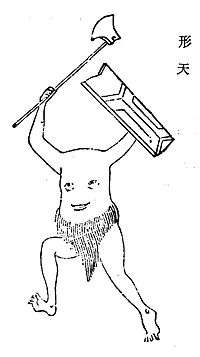Xing Tian

Xing Tian (Chinese: 刑天; pinyin: Xíngtiān) is a notable[1] deity of Chinese mythology who fights against the Supreme Divinity (sometimes known as Tian), not giving up even after the event of his decapitation. Losing the fight for supremacy, he was beheaded and his head buried in Changyang Mountain. Nevertheless, headless, with a shield in one hand and a battle axe in the other, he continues the fight, using for eyes his nipples and for a mouth his bellybutton.[1]
In literature
Shanhaijing
Xingtian is encountered in chapter 7 of the Classic of Mountains and Seas (or Shanhaijing)[1] as well as in subsequent works, such as a poem by Tao Yuanming (367–427 CE).[2] In the history Lushi compiled by Luo Mi, Xingtian is described as a minister of Yan Di, who composed music for farmers for plowing and harvesting, however this Xingtian is written with a different character for Xing, but many scholars argue that it represent the same figure.[2]
The following excerpt is from the Shanhaijing:
刑天與帝爭神,帝斷其首,葬之常羊之山,乃以乳為目,以臍為口,操干戚以舞。
Roughly translated:
Xingtian fought against [Huang] Di. Di cut off his head, and the head was buried in the Changyang Mountains. But Xingtian, with his breasts as eyes, and his navel as mouth, continued to fight with his axe and shield.
In oracle script
According to oracle bones, during ancient times the giant Xíng Tiān was originally a follower of the Emperor Yán. After the victory of the Yellow Emperor over Yán at the Battle of Banquan, Xíng Tiān followed his master to exile in the south. At this time, the giant had no name.
After the Yellow Emperor defeated and executed Chi You, Xíng Tiān went forth with an axe and shield (some description gave a blade instead) against the Yellow Emperor. He forced his way to the southern Gate of the Celestial Court and issued a challenge to the Yellow Emperor for a duel.
The Yellow Emperor came forth and the two engaged in a ferocious combat, sword (昆吾剑) against axe, all the way down to earth to ChángYáng Mountain (常羊之山). In a final blow, the Yellow Emperor distracted his opponent with a trick and lunged ... and in a flash decapitated Xíng Tiān, whose head rolled all the way to the foot of the mountain and created a thunderous roar.
Instead of dying, Xíng Tiān was able to continue moving and began groping about for his head. The Yellow Emperor raised his sword to strike the mountain. The mountain split open, the head rolled within and the mountain closed again.
Xíng Tiān gave up looking for his head, and instead used his nipples as eyes that could not see, and navel as a mouth that could not open. He began striking about wildly, giving rise to the saying "刑天舞干戚,猛志固常在" (undying resolution). Thereafter, the headless giant got his name, which meant "He whose head was chopped off".
Symbolism
Xingtian symbolizes the indomitable spirit which never surrenders and maintains the will to resist no matter what tribulations one may undergo or what troubles one may encounter.[3]
Modern References
- Xing Tian has appeared through China's recent online gaming boom as a monster the player must defeat. In Shura Online, Xing Tian is a leader of its own demon tribe.
- The Mecha in the anime Tengen Toppa Gurren Lagann, known as Gunmen were inspired by Xing Tian's appearance, being mostly torsos with faces.
- Xing Tian has appeared in various Chinese online novels
- Xing Tian was played by Nicky Wu in the TV series based on another Chinese Myth Jingwei tries to refill the Sea (精卫填海 )
- In SMITE, Xing Tian is a playable character as a Guardian, titled The Relentless.
- In Shadow Warrior (2013 video game), Xing Tian is one of the Ancients, immortal demon beings ruling over the Shadow Realm.
See also
References
Citations
Sources
- Yang, Lihui, et al. (2005). Handbook of Chinese Mythology. New York: Oxford University Press. ISBN 978-0-19-533263-6
- Myths of Ancient China, ISBN 9971-985-00-4, Asiapac Books & Educational Aids (S) Pte Ltd
- Of Mountains and Seas